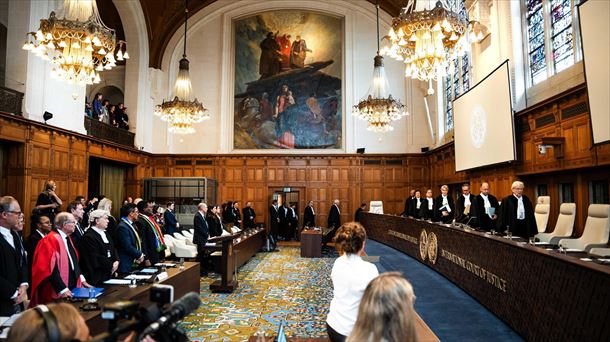Hideout. 250,000 people have already passed through the first city encountered by the displaced after fleeing the area controlled by the Moscow army in eastern Ukraine
Hundreds of people patiently wait their turn at the gates of the Kozak Palats, the main exhibition center in Zaporizhzhya. This city in southeastern Ukraine has become a kind of capital for displaced persons fleeing areas under Russian control. “In these two months of war, we have taken care of 250,000 people and the needs are enormous. The military administration is doing what it can, but we are taking care of people who have lost everything, left home with nothing on their backs and need food, shelter and shelter…” explains Viacheslav, who is responsible for managing a service run by volunteers. In the enclosure they find clothing, food, toys, medical consultations and what is needed to get through the first few days.
Among the dozen workers is María, an International Relations student who assures that “many more people would be encouraged to go outside if the Russians respected the corridors. They don’t and there are no safe routes for civilians.” The escape routes are complicated and the agreements, such as the one that allowed the recent departure of civilians from the Azovstal metallurgical plant in Mariúpol, are punctual.
The front is about 60 kilometers to the south and the Russians control most of a province, where they try, among other things, to introduce the ruble as currency instead of the hryvnia. Most of the newcomers are just passing through and from there they leave for other parts of Ukraine or Europe, with Poland as the number one destination.
A few remain and the Medical School dormitory has become a makeshift home for 412 people. They now share the campus with the hundreds of students who cannot go home because they have been abandoned in occupied territory. The war has forced a return to online classes and has emptied classrooms, but it has brought the displaced “and we believe that for a long time. You have to be prepared for a long war, “laments Natalia, one of those responsible.
The children run through the long corridors, careful not to run over the stalls where the clothes are drying. Four students used to sleep in each room. Now they adapt to the needs of each family. Ludmila Vladinobodna is alone. He escaped fighting in the village where he lived near Donetsk a month ago. “I left with what I was wearing, I didn’t have time for anything. The artillery fire was fierce, several houses were on fire and I ran,” he explains, not holding back his emotion. He kept only an icon of the Virgin Mary and a photo of her sixtieth birthday, where she was in the middle of her children and grandchildren appear. “Here I feel human again, but this is a temporary solution. All I want is peace, stop this war once and for all”, he pauses forever to catch his breath and bursts into tears “My God, what did we do to deserve this?” he asks, holding the icon tightly.
Diana, 15, and her grandmother Eulogia live in the next room. They escaped from Mariupol two weeks ago. It was “a very dangerous outing, between shots and explosions, but we couldn’t stay in our house for a minute longer,” recalls Diana, a photography student who now dreams of going to Warsaw to continue her education. They also left with what they were wearing, they live off the help they get and the grandmother also has the medical care that the university gives her. At 15, Diana speaks with a serenity and seriousness that silences the small room, thinking they cannot be trusted “because the war is very close and the Russians may advance”. “Our big fear is that they will launch an offensive and turn Zaporizhzhya into a new Mariupol, so I think we need to get out of here as soon as possible,” he says.
The hallway smells of borscht, the traditional beetroot soup, boiling in a large pan in the shared kitchen. Nicolás Marchenko looks with one eye at the reddish broth and with the other he watches the mobile in case a message comes in from his daughter, who lives in Singapore. After a decade in Argentina, Nicolás decided to return to his home, a small village 100 kilometers from Zaporizhzhya, and the war took him by surprise. “The worst of all is the uncertainty. There’s no way of knowing what might happen to us in the next second, there’s no point in making plans. After living thousands of miles from my country, I don’t want to leave, I plan to wait for this to calm down to return and see if my house is still there,” he says.
Source: La Verdad
I am an experienced and passionate journalist with a strong track record in news website reporting. I specialize in technology coverage, breaking stories on the latest developments and trends from around the world. Working for Today Times Live has given me the opportunity to write thought-provoking pieces that have caught the attention of many readers.



